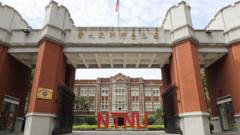A looming recall election in Taiwan targets lawmakers accused of being too close to China, igniting protests and deepening political divisions. The anticipated outcome may reshape the Legislative Yuan, revealing the complex interplay of civic activism, party politics, and the struggle for Taiwan's democratic identity.
The Great Recall: Taiwan's Political Divide Deepens Ahead of Critical Vote

The Great Recall: Taiwan's Political Divide Deepens Ahead of Critical Vote
As Taiwan prepares for an unprecedented vote to recall lawmakers seen as pro-China, civic activism and political tensions reach a boiling point, highlighting an increasingly polarized society.
In a significant showdown, Taiwan is set to undertake a highly contentious recall vote targeting lawmakers perceived as having close ties to China. This unprecedented move, referred to as "dabamian" or the Great Recall, positions thousands of citizens at the forefront of political activism in the island nation, amid fears of increasing Chinese influence in its legislature.
Deng Pu, a photographer turned activist, is among many who have taken to the streets driven by frustration towards legislative actions they deem undemocratic. "We are citizens... and we need to make sure our society sticks to its democratic systems and spirit," he asserted, encapsulating the sentiments of a growing movement demanding reform. The election, scheduled for Saturday, could dramatically shift the Legislative Yuan's power balance, with over two dozen lawmakers squarely in the crosshairs of the electorate.
The political landscape has shifted dramatically since the January elections, which saw the Democratic Progressive Party (DPP) president, William Lai, elected, but paved the way for opposition dominance. The Kuomintang (KMT) party and its allies have united to obstruct various governmental initiatives, including alterations to the budget and constitutional adjustments, triggering widespread outrage from supporters of the DPP.
In response, activists mobilized under the now-prominent Bluebird movement, protesting perceived efforts by the opposition to align Taiwan with Beijing's agenda. Civilians venting their frustrations rallied in droves, urging the ousting of the KMT lawmakers' seats.
With the recall election fast approaching, civic groups have harnessed social media and grassroots campaigning to bolster support, realizing that voter turnout is critical to the success of the recalls. Polls will assess the approval of specific lawmakers, with stark regulations in place regarding the quantum of support required to enact the changes.
However, the political climate remains volatile, with allegations targeting both the DPP for allegedly orchestrating the recall movement and KMT asserting a campaign of intimidation against their lawmakers. This mutual distrust serves to deepen political fissures, fueling rallies on both sides of the debate.
Beyond the immediate implications for individual lawmakers, experts suggest that the Great Recall serves as a litmus test for Taiwan's political dynamics and civic engagement. Analysts posit that regardless of the outcome, the discourse stirred by the recall could create opportunities for renewed activism.
The stakes encompass more than individual politics, as the outcome may redefine the relationship between citizens and their lawmakers while underscoring the importance of democratic processes in Taiwan. Whether this fervor will lead to a realignment of power or further entrench the divisions remains to be seen, but the nation's citizens are poised to collectively decide their legislative future.


















